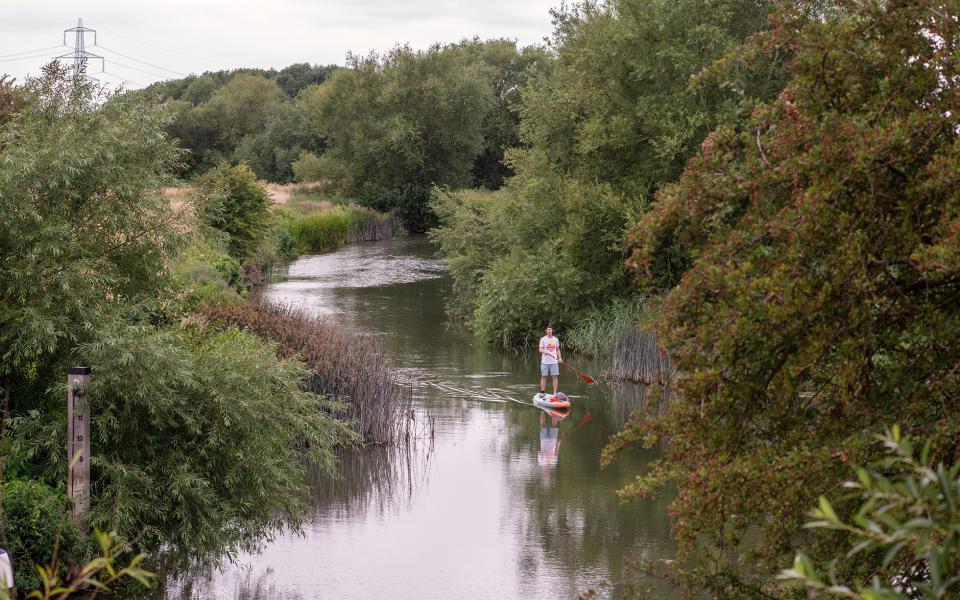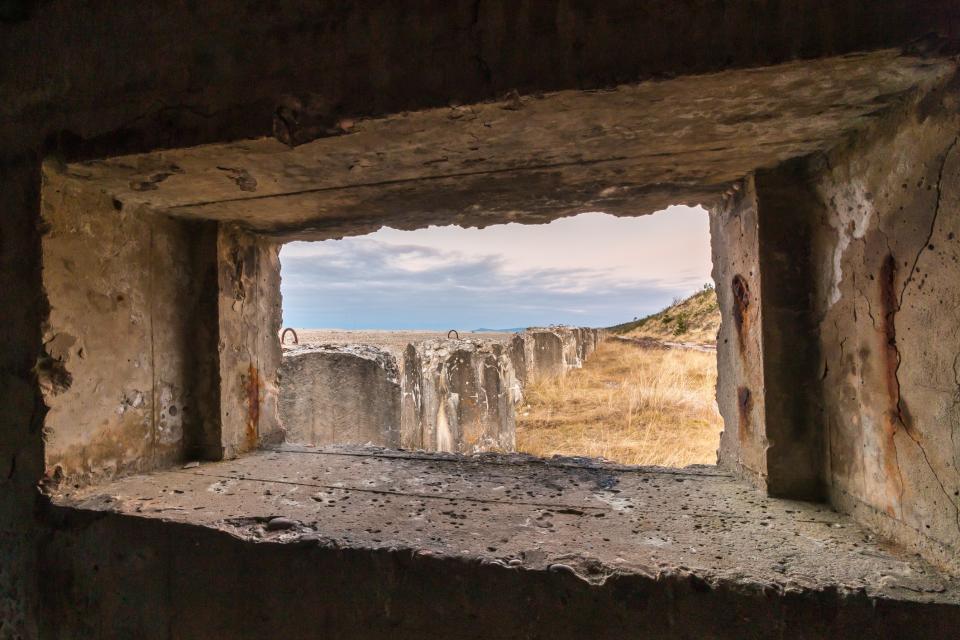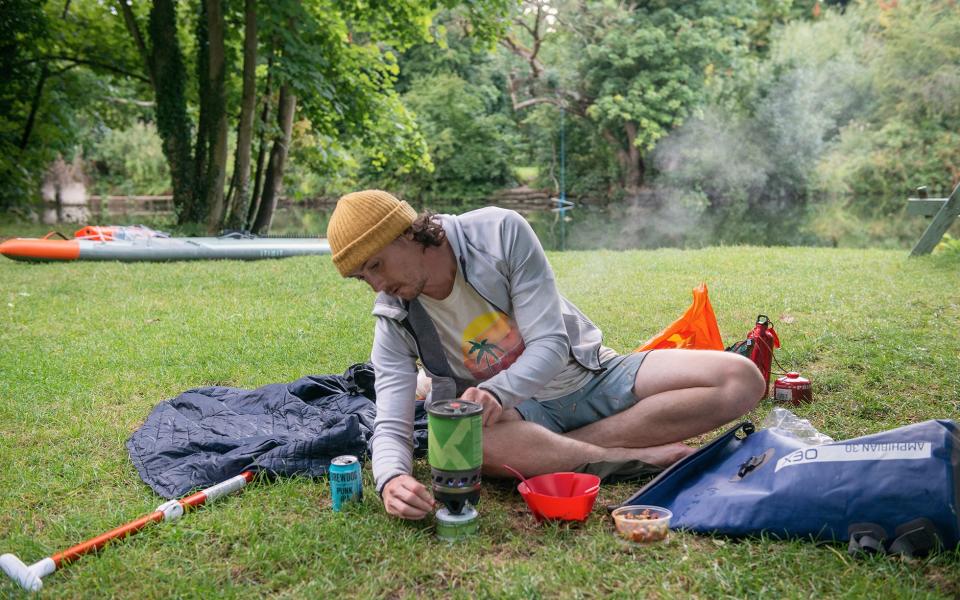England and the English, as seen from the Thames

Tom Owen travelled the length of the Thames on a paddleboard. Here’s what he learnt
Swans, swans, everywhere…
The beginning of the Thames, or at least the part around Castle Eaton where you can actually float a paddleboard, is small and narrow. On either side great tall grey reeds reach up to the sky, creating a Conradesque channel through which to float one’s craft.
Imagine my dismay, then, on meeting a family of swans blocking my path. The overprotective father did his best to menace me, fluffing its wings up and making a beeline right for my starboard bow. Using the paddle, I was able to keep it at arm’s length, but this rendered me unable to propel the craft past him and his terrifying clan. Thinking on my feet – as one has to on a paddleboard – I devised a way of swiping at the beast while also dabbing the water with each stroke, and thus slowly edging by.
In the following days, after the terror had subsided and I could no longer hear my own heartbeat, I undertook a survey of swan numbers along the Thames. I can say confidently that England is entirely oversupplied with these ungainly ducks. They achieve absolutely nothing of use, while gliding about and menacing vulnerable water users whenever it takes their fancy. The Queen ought to stop protecting them and turn them into sausages.
The English are a hopeful people
In a twist on the oft-recited workplace axiom, ‘dress for the job you want not the job you have’, the English dress for the weather they want, not the actual meteorological conditions overhead. No dreich skies, nor driving rain – nor any worldwide pandemic – can stop an Englishman from sitting in a beer garden in shorts and T-shirt drinking pints of San Miguel, purely because it is a Wednesday afternoon and he is not at work.

English pub landlords take varying approaches to the global health crisis
And speaking of the pandemic, I did not visit many businesses along my route, just one or two supermarkets and a handful of pubs. I did, however, observe a great variation in said hostelries of the application of social distancing measures, implementation of track and trace, and the use of PPE. I would not recommend the village boozer in Dorchester-on-Thames if you or anyone you know is shielding. The fish and chips was quite good, though.
The Englishman can find ways to be miserable, even on his holidays
Many were the hurried, harried male faces I saw, put out by reasons unseen. Often, the larger the boat, the gloomier the scowl. I was cheered for a good few hours by the scowling visage of a tanned, white-haired old coot in a holiday boat who – minorly inconvenienced by a flotilla of young canoeists – refused even to return my cheerful good morning as I glided by. His wife smiled at me apologetically, in a way that suggested she might have seen him sulking like this once or twice before. ‘Divorce him, love!’ I wanted to yell.

Rowing with rowers
You’ll find a lot of rowers on the river, particularly around Marlow and Henley, but generally they are scattered about up and down the navigable reaches of the Thames. Mostly they come out early in the morning, when the wind is low and the waterways free of tourist traffic. And mostly they are pleasant people, far less cranky than the motor boaters and much less malevolent than the swans. That being said, there was one woman who, upon nearly crashing into me with her silly pointy boat – why they insist on facing backwards when travelling at such a frightful speed I cannot comprehend – chastised me for not being visible enough.
As a tall bloke and with two unusually long, pallid white arms flailing about with a bright orange paddle, it never occurred that someone could ‘miss’ me. But then, who am I, a paddling parvenu, to argue with a member in good standing of the Marlow Rowing Club?
There are a remarkable number of pillboxes along the Thames
Even as far up as Gloucestershire, you will see one or two pillboxes a day. Built in preparedness for an invasion from Europe that never quite arrived, they now exist as odd little disturbances to the bucolic vistas. When I commented on this strange preponderance to a family member who came down to wave from the river bank, she told me that she had met an American photographer once who came expressly to take pictures of these concrete lumps outside her village – and his long-suffering wife. Speaking out of earshot of her husband, this beleaguered woman had told my aunt.
“If I ever see another pillbox I will go crazy.”
Well, quite.

Oh, for the simple life of a lock-keeper
I am given to believe that lock-keepers provide a vital service, keeping the waterways moving and preserving a centuries-old part of English rural life.
They do this, as far as I was able to observe, by keeping up a continuous conversation on their mobile phones, while occasionally pausing to scowl at passing paddleboarders.

On the Thames you can – in the space of a few minutes – witness the result of outrageous privilege and the mechanisms by which it is preserved
From a languid turn in the river after the Sonning Eye, one can marvel up at Shiplake College, a gorgeous, Hogwartian school perched high on the hill, where doubtless future investment bankers are churned out at a rate of knots.
Then, minutes later in Lower Shiplake, the gaudy mansions of the ultra-rich come rambling down to the water’s edge – at least half currently unoccupied, by the way. I suppose that it is not a crime in and of itself to be so rich, but I would think they ought to at least be obliged to build nice-looking houses with their dosh, not these mock-Tudor monstrosities.

England may feel claustrophobic, but much of it remains gloriously untouched
Lockdown notwithstanding, England feels increasingly ‘full’. Everywhere, more houses are being built, on every fringe of every suburban town and the constant encroachment into the green belt is a wearying trend. It makes England seem divorced from adventure, an unwild and unexciting place.
Refreshingly, then, there are still parts of this ancient little kingdom where there seems to be not a soul. Heavily forested hillsides run down to the bank of the river at Hartslock and Cliveden, giving a true sense of the effects this ancient waterway has had on its surroundings. Steep banks with dense reed growth obscure the view from water level of the rambling empty fields above. Between Radcot and Chimney at the upper end of the river, there is nearly nothing at the riverside for five uninterrupted miles (or two full hours of paddling at my sedate speeds).
At dusk, the river and the land nearby also teem with life. Red kites soar above the river whether you are in Reading or rural Gloucestershire, while grebes are a common sight. As you float by the trailing limbs of trees on the bank, large and weighty splashes can be heard, created by aquatic mammals unseen diving from their boughs. Collared doves come exploding from the canopies too, seemingly surprised at seeing another living beast on the water.

Playing the hits
While there are many surprising places along the Thames – its tiny aits and deserted locks where one can throw up a tent and camp for the night – there are also the showpiece landmarks, the river’s greatest hits.
The sight of the Radcliffe Camera when one descends from Godstow Lock and crosses into the fringes of Oxford is truly remarkable. Likewise, I think it would be impossible for an Englishman not to feel some frisson of excitement upon seeing the Round Tower of Windsor Castle.
Temple Island near Henley is iconic because of its association with the town’s regatta, but is an equally lovely place to sit and shelter from a thunderstorm – although strictly this is not allowed, the island being private land.
The sight of Hampton Court Palace, where I finished my meander, was particularly exciting after a year spent slowly plodding through the absorbing Wolf Hall trilogy by Hillary Mantel.
These places take on a more magical quality when seen from the water. One is reliving history along a watercourse older than England itself.



